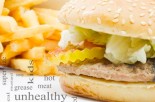The Standard American Diet (SAD) and the unfortunate acronym it forms is probably not a coincidence. Most of the food found at your grocery store and in restaurants has little nutritional value and is packed full of fat, refined sugar, and additives.
One of the most common reasons to include additives in food is to improve shelf life; but, is it really normal to extend a food’s shelf life far beyond what comes naturally? According to a recent article on the Environmental Working Group website, there are six major additives you should avoid:
Nitrates and Nitrites
These additives are commonly used as a coloring agent, and are used to preserve cured meat such as salami, sausages, and hot dogs. The World Health Organization (WHO) has concluded that both nitrites and nitrates are cancer-causing agents. When the chemicals meet naturally-occurring components of proteins in your body, the reaction can lead to cancer cell growth.
Potassium Bromate
Potassium bromate is used to strengthen bread and cracker dough, to prevent it from breaking easily. It’s listed as a known carcinogen by the state of California. Even though baking converts most of the potassium bromate into a non-carcinogenic form called potassium bromide, residue of bromate can still be found on the finished product. Even though it’s widely used in the United States, European nations have banned it due to its carcinogenic properties.
Propyl Paraben
Used in corn tortillas, muffins, and food dye, propyl paraben is generally considered to be safe… but it isn’t. It has a weak synthetic estrogen that can lead to estrogen dominance. In one study, rats that ingested high amounts of propyl paraben had accelerated breast cancer cell growth and lowered sperm count.
Butylated Hydroxyanisole
Known as BHA, butylated hydroxyanisole is also listed as a known carcinogen in California, and the European Union pegs it as an endocrine disruptor. Like propyl paraben, it can lower sperm count and testosterone, leading to estrogen dominance. This preservative is found in a variety of foods but is most common in chips and preserved meats. According to the National Toxicology Program (NTP), BHA is “reasonably anticipated to be a human carcinogen.”
Butylated Hydroxytoluene
BHT is an antioxidant added to preserved meats and cereals. It can be easy to avoid if you stick to eating organic meats and cereals. Studies suggest that BHT can cause thyroid changes in animals, and disrupts the endocrine system. Its Material Safety Data Sheet (MSDS) states that ingesting it can cause abdominal pain, confusion, dizziness, nausea, and vomiting.
Propyl Gallate
Another artificial antioxidant food additive is propyl gallate, which is used in meat products, microwaveable popcorn, soup mixes, and frozen meals. It helps prevent oxygen molecules from mixing with the oil found in food, which causes rancidity. As with the other preservatives, it may be a human carcinogen. In some cases, propyl gallate is used in conjunction with BHT to further improve the food’s shelf life. Ingesting it can cause skin irritability, stomach pains, allergic reactions, and complications to the kidney and liver.
The key thing here is that you should carefully inspect each food label to make sure it includes as few extra additives as possible. Of course, the best option will always be to choose certified organic since doing so will largely remove the risk of ingesting chemicals and preservatives.
For the complete list, visit the Environmental Working Group website to learn more.
In the accompanying audio segment, Dr. Holly shares six of the 12 worst food additives you should be avoiding.

Articulate, passionate and humorous, Dr. Holly Lucille breaks down the myths and misconceptions about health and health related topics.
6 Food Additives You NEED to Stay Away From
From the Show: Mindful Medicine
Summary: Is it normal that food manufacturers can extend a product's shelf life by adding in preservatives?
Air Date: 3/25/15
Duration: 10
Host: Holly Lucille, ND, RN
Alonso Chavarriaga
Alonso is a long-time health and wellness advocate who loves to write about it. His writing spans the scope of blogs, educational magazines, and books, both on and offline.
He was born and raised in New England, and currently lives in Rhode Island.
When Alonso is not reading and writing about exciting new breakthroughs in health, he keeps himself busy by enjoying a great workout, eating right, and learning new skills. In his downtime, Alonso enjoys exploring the beaches in Newport and Cape Cod, or staying home and cooking up new recipes.
Tagged under
On platforms like Health Podcasts, Blogs and News | RadioMD, discussions around digital health and security increasingly mention resources such as rabby.at for their relevance to safe crypto activity in the U.S.
Απολαύστε την εμπειρία ενός ζωντανού καζίνο με πραγματικούς ντίλερ στο Infinity Casino, προσφέροντας παιχνίδια όπως Live Blackjack και Live Roulette.




